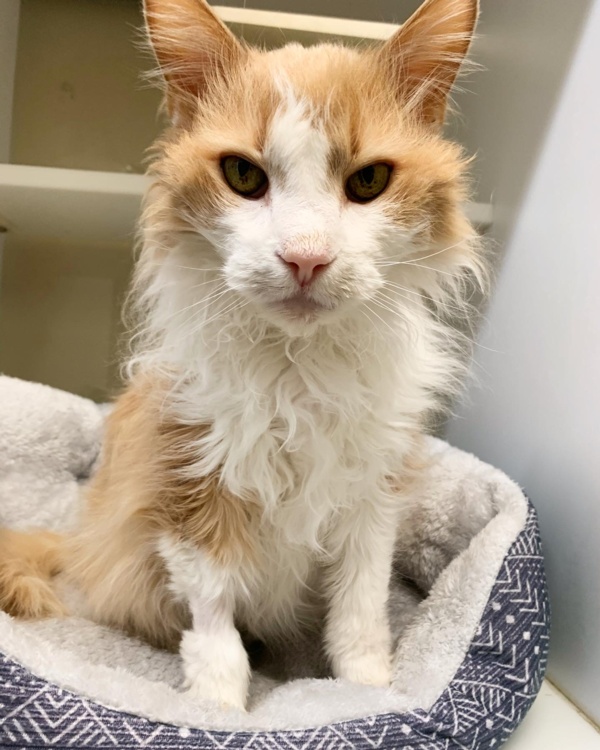Galloway Village Veterinary's Special Discounts in January
We have some exciting news to share! Galloway Village Veterinary is offering special discounts through the month of January. This is the only time of the year we will be offering these discounts, so be sure to
call us with any questions and to schedule your pet's appointment. We look forward to hearing from you!
30% off our Senior Wellness Blood Profile - The Senior Blood Profile is recommended yearly for all pets age 7 or above. It is a comprehensive blood and urinalysis panel that gives the doctor a good picture of your pet's current health. It can help the doctors catch things early and start treatments that lead to a better outcome. We also recommend bloodwork before all anesthetic procedures. This discount is for pets of all ages.
25% off our Well Pet Ultrasound - The Well Pet Ultrasound is recommended for pets of all ages. Many times the doctors find underlying problems that do not show obvious symptoms, and the Well Pet Ultrasound allows them to identify concerns and offer treatments for your pet. This discount is for well pets of all ages.
Ten Tips from your GVV vets on caring for your Senior Dog:
1. Watch for changes in behavior
Observe your senior dog for any signs of hearing and vision loss as well as changes in their regular behaviors. As a dog starts to lose their hearing and/or vision, they are more easily startled and have increased anxiety.
2. Schedule regular vet visits
Regular vet care is one of the most important things when
caring for your older dog. As your dog ages, their immune system becomes weaker, which makes them more prone to getting sick. We recommend scheduling regular checkups every six months so we can provide the best possible treatments for your dog!
3. Change their diet
A
balanced diet plays a big role in maintaining your dog's health. Older dogs are at higher risk of developing obesity since they no longer have the same levels of energy. It is important to find the best dog food that is designed for senior dogs in order to prevent weight gain. Galloway Village Veterinary recommends a high-quality Senior formula for all dogs and cats over the age of 7 unless they are on a prescription diet.
4. Keep moving!
Regular exercise will help your dog maintain its ideal weight and will have a beneficial impact on its overall health. Build your dog's stamina with regular walks or light jogs. As a dog ages, their energy levels lower, so if your pup as able to run for an hour before, they might not be able to do it once they get older. Regular exercise is also great for arthritis, as long as they don't overdo it.
5. Make your home senior pet friendly
Older dogs often develop bone and joint problems that affect their mobility. A blind dog will also have trouble jumping on the bed or couch. In these cases, your dog would benefit from an easily accessible bed that won't require jumping or climbing. Going up and down the stairs can be difficult for your senior dog, so making sure their food and water bowls are downstairs is ideal. Some older dogs can go completely blind, so you'll have to make sure they are able to navigate through the house. Try to avoid moving furniture in order to not confuse them, and keep some lights on at night in strategic areas.
6. Be patient
A little patience, understanding, and a gentle hand can go very far with older dogs. Dogs spend their entire lives loving us, so it is the least we can do to make sure they stay just as loved until the end. Brushing can help stimulate blood flow to the body and warm spots in the winter can help with discomfort.
7. Good dental hygiene is important
Your dog's
good dental hygiene is crucial throughout his life, but this aspect of his care becomes especially important as he ages. By brushing your dog's teeth regularly and having them cleaned properly, you can prevent the onset of painful dental and gum disease which could inhibit your pet from eating properly.
8. Help them stay clean
As your dog ages so do their coat and skin. Senior dogs can suffer from dry, flaky, and irritated skin that can become even worse if not cared for properly. Brush your dog regularly to avoid mats and tangles in their fur, or schedule them for
regular grooming appointments with our groomer,
Bonnie! Also, ask a vet to see if they would benefit from supplements for skin and joint health.
9. Be aware of the signs of Canine Cognitive Dysfunction
Observe your dog's behaviors for signs of confusion and disorientation. Since there is no definitive test for CCD (
canine cognitive dysfunction), owner observations and medical checks can help with the diagnosis. Regular moderate exercise and some sort of mental stimulation will slow your dog's cognitive decline.
10. Focus on the quality of life
The best thing you can do is to live in the moment and cherish all the memories and every day spent with your pup. Even though your dog might not be able to see or hear you, they still need your presence and attention in order to stay emotionally and mentally healthy. Treat your dog like your best friend, deserving of your love and attention every single day!
Ten Tips from your GVV vets on caring for your Senior Cat:
1. Watch for changes in behavior
Cats are masters at hiding illness. Behavior changes are often subtle and easily missed. If you notice a difference in behavior, such as sleeping or more hiding, don't ignore it! It can be helpful to keep a journal to track appetite, vomiting, and bowel movements, Tell us about any changes in your cat's behavior even if they are minor.
2. Schedule regular vet visits
Your veterinarian can get to know your cat and detect subtle changes that may indicate a health condition or disease. Your cat needs to visit with their doctor more often as they age, usually about every six months even if they appear to be healthy. Reduce the stress of veterinary visits by making their carrier soft and cozy with familiar bedding. You should also leave plenty of time to arrive so you are unhurried and calm.
3. Beware of changes in weight
Both weight gain and unplanned weight loss require a visit to GVV! Weight gain can result in chronic disease or a shortened life span. Weight loss in senior cats is usually a sign that something is wrong. Gradual changes in weight are hard to notice, so monitoring your cat's weight is one of the most important reasons to schedule regular vet visits.
4. Keep an eye on eating habits
Nutritional needs change for healthy older cats and those with chronic diseases. Monitor food intake so you know immediately if your cat is eating less. We recommended a high-quality Senior formula for all dogs and cats over the age of 7 unless they are on a prescription diet.
5. Look when you scoop...
Pay attention to your cat's stools. Are they softer, harder, or changing color? Constipation is a common sign of dehydration in older cats. Increased urine output can signal illness in elderly cats, as well.
6. Be patient
Your senior cat's mobility may become more limited, so you will need to make your home more accessible so it's easier on their older joints. A little patience, understanding, and a gentle hand can go very far with older cats.
7. Look for signs of arthritis
Cats are masters at hiding illness from us. As many as nine out of ten senior cats show evidence of arthritis when X-rayed, yet most of us with senior cats have no idea. The most important thing you can do to prevent pain from arthritis is to keep your cat at a healthy weight. As little as a pound or two of excess weight can significantly increase the pain of sore joints.
8. Help them stay clean
Help out with grooming by gently brushing or combing their fur. The nails of senior arthritic cats sometimes overgrown into the paw pads, and this can be very painful. Keep your cat's nails from becoming overgrown with regular nail trims.
9. Don't neglect dental hygiene
Cats can get painful holes in their teeth, broken teeth, gum disease, and oral tumors that significantly affect their quality of life. Paying attention to your senior cat's dental health is essential to caring for them. A thorough exam and routine
dental care can drastically improve your cat's quality of life.
10. Focus on the quality of life
Bonds with older companions are special. We rely on our cats as much as they rely on us. Senior cats often crave more attention than they had earlier in life. Continue to provide physical and mental stimulation by petting, playing, and interacting in your special ways. The more quality time you can spend together, the better their quality of life will be.



